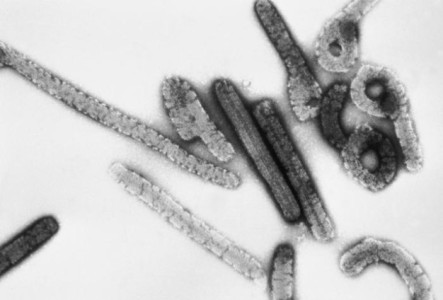Marburg virus disease confirmed in Ghana – Ghana Health Service

The Ghana Health Service (GHS) says it has confirmed the presence of the Marburg Virus Disease in the country.
According to the Service, this is the first time the disease has found its way into the populace.
In a statement issued on Sunday, July 17, the GHS explained that the presence of the virus was confirmed after it run a number of tests.
The statement, which was signed by the Director-General of the Ghana Health Service, Dr Patrick Kuma-Aboagye, said, “Following the report of the preliminary finding of two cases of Marburg Virus Disease (MVD) from the Ashanti Region on 7th July 2022, the Ghana Health Service (GHS) wishes to announce that further testing at the Institute Pasteur in Dakar (IPD), Senegal has corroborated the results from Noguchi Memorial Institute for Medical Research.
The samples were sent to IPD with the support of the World Health Organization (WHO) for validation in line with standard practice, this being the first time Ghana has confirmed Marburg Virus Disease”.
Marburg virus disease confirmed in Ghana – Ghana Health Service
Page 1 of the statement from the Ghana Health Service confirming the Marburg Virus Disease in Ghana
The statement continued: “The disease was suspected following the identification of two persons who met the case definition for an Acute Haemorrhagic Fever and reported in Adansi North District of Ashanti Region.
So far, 98 contacts identified including those from Sawla-Tuna-Kalba district from Savannah Region are currently under quarantine and being monitored by the Ashanti and Savannah Regional Health Directorates of the Ghana Health Service. No new cases of MVD have been identified”.
Meanwhile, the Ghana Health Service has assured that it is collaborating with all relevant agencies to ensure that citizens are safe from this latest development.
In that regard, the Service said the measures to prevent a spread include, “the isolation of all identified contacts including doctors and other healthcare workers”.
Marburg virus disease confirmed in Ghana – Ghana Health Service
Page 2 of the statement from the Ghana Health Service confirming the Marburg Virus Disease in Ghana
It added that “following the confirmation of the cases, contact tracing has been expanded with the identification of more contacts being followed up for the maximum incubation period of 21 days.
A reasonable number of contacts have been followed up for 19 days with none developing any symptoms.
In addition, thirteen (13) of the contacts were randomly selected and tested at the Noguchi Memorial Institute for Medical Research. All 13 contacts tested negative for Marburg Virus”.
The Service further indicated that “community activities are being strengthened with the engagement of community-based surveillance volunteers who serve as eyes on the ground for the health system and who will report any unusual occurrences to the Ghana Health Service for further action”.
It also revealed that following this development, logistics such as “Personal Protection Equipment have been sent to the affected districts should the need arise”.
Information about the Disease
In the statement by the GHS, it said the “Marburg Virus Disease caused by the Marburg virus is a rare but severe haemorrhagic fever that affects both humans and non-human primates and fruit bats are natural hosts of Marburg virus.
The Marburg virus is transmitted to people from animals and spreads among humans through human-to-human transmission from direct contact with body fluids, blood and other discharges from the affected person/animal.
The incubation period for the disease is two (2) to twenty-one (21) days. Treatment is symptomatic.
Persons with MVD may present with: fever, bloody diarrhoea, bleeding from gums, bleeding into the skin, bleeding into eyes and bloody urine”.
Prevention tips by the Ghana Health Service
To tackle the rate of infection, the Ghana Health Service went ahead to say that:
“Marburg virus disease can spread from infected animals such as bats on direct contact with blood and other body fluids including faeces of bats.
The risk of bat-to-human transmission can be reduced by avoiding exposure to mines or caves inhabited by fruit bat colonies.
All animal products (blood and meat) should be thoroughly cooked before consumption. There is currently no vaccine available.
The public is therefore advised to avoid contact with such animals. Marburg virus disease can also spread from an infected person to another person.
The public is therefore advised to avoid direct contact with persons showing the symptoms indicated above and to encourage such persons to report to the nearest health facility for appropriate assessment”.
Source: MyJoyOnline.com




